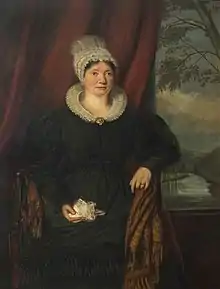Elizabeth Crichton
Elizabeth Crichton (1779 – 1862) was a British philanthropist who founded the Crichton Royal Hospital in Dumfries. She had wanted to create a university but it was opened instead as the Crichton Institution for Lunatics in 1839. It now holds part of several universities and in her memory: a cathedral like church and her statue.
Elizabeth Crichton | |
|---|---|
 Elizabeth Crichton by unknown artist | |
| Born | Elizabeth Grierson 1779 Rockhall |
| Died | 11 October 1862 Friars Carse |
| Nationality | Great Britain |
| Known for | Creating the Crichton Royal Hospital in Dumfries |
Life
Crichton was born in Rockhall in 1779 to Margaret Dalzell and Sir Robert Grierson fifth baronet. In 1810 she married James Crichton who had qualified as a doctor at Edinburgh University but whose fortune was made after he had joined the East India Company. He practised medicine but it was his trading in India and China that left Elizabeth a rich widow. He had left £100,000 and his widow was allowed to spend it on any project agreed by the trustees.[1]

It was said that she wanted to create a university in Dumfries but she was prevented by the existing Scottish universities.[2] The original hospital building, now The Crichton, was designed by William Burn and opened as the Crichton Institution for Lunatics in 1839.[3] It became the Crichton Royal Institution in 1840.[4] The Southern Counties Asylum, which was intended to provide facilities for paupers, was erected on the site in 1849 and subsequently amalgamated with the main facility.[5]
Crichton persuaded the phrenologist William A. F. Browne to become Crichton's medical superintendent and to implement his ideas of both occupational therapy and art therapy.[6] She travelled to Montrose Asylum, interviewed Browne and offered him the equivalent post at the Crichton Royal in Dumfries.[7] Browne remained at the Crichton for almost twenty years (1838-1857) setting new standards in therapeutic administration. In 1843 the hospital staged a theatre production where all the actors and musicians were patients and the following year the patients started a paper, New Moon, that was published for the next 92 years. The patients would be taken on picnics and Crichton would visit regularly to hear of Crichton Hall's progress.[1]
Crichton Memorial Church is a huge building that was built as a memorial to her and her husband fifty years after the creation of the foundation that they had created. It was designed by Sydney Mitchell and construction lasted from 1890 to 1897.[8] A statue of her was unveiled in May 2000 near to the Crichton Memorial Church in Dumfries. The statue is by Bill Scott and is one of the small number of memorials to women in Scotland.[9]
References
- "Crichton [née Grierson], Elizabeth (1779–1862), founder of the Crichton Royal Hospital, Dumfries | Oxford Dictionary of National Biography". Oxford Dictionary of National Biography (online ed.). Oxford University Press. 2004. doi:10.1093/ref:odnb/73998. Retrieved 6 March 2020. (Subscription or UK public library membership required.)
- Jones, H. Longueville (1838). "University of Dumfries". Journal of the Statistical Society of London. Journal of the Royal Statistical Society. 1 (7): 392. JSTOR 2337769.
- Historic Environment Scotland. "Crichton Royal Hospital Crichton Hall (Category A Listed Building) (LB3839)". Retrieved 20 March 2019.
- "Crichton Royal Hospital, Dumfries". National Archives. Retrieved 24 January 2019.
- "The Crichton". Historic Hospitals. 31 May 2015. Retrieved 26 April 2019.
- "Elizabeth Crichton – A Woman with a Dream". The Crichton Trust. Retrieved 6 March 2020.
- Allan Beveridge, ed. (2005). "Psychiatry in pictures – 186 (1): 1-a1 – The British Journal of Psychiatry". The British Journal of Psychiatry. 186 (1): 1–a1. doi:10.1192/bjp.186.1.1-a1. Retrieved 9 February 2009.
- "Crichton Memorial Church from The Gazetteer for Scotland". www.scottish-places.info. Retrieved 7 March 2020.
- "Statue of Elizabeth Crichton | Mapping Memorials to Women in Scotland". womenofscotland.org.uk. Retrieved 7 March 2020.